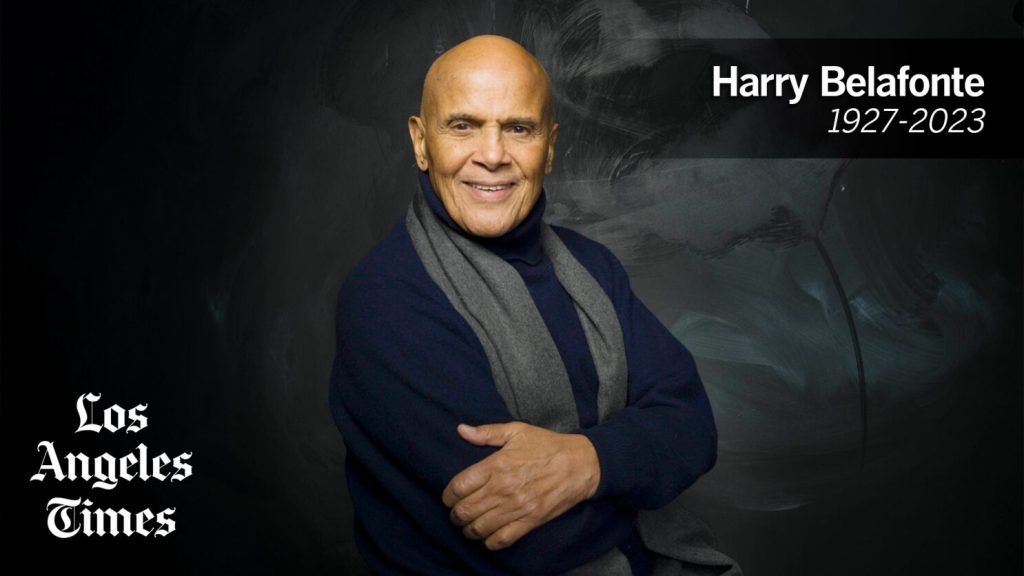By Ed Rampell
The multi-talented, widely admired performer Harry Belafonte died Tuesday, April 25, at age 96. He was born on March 1, 1927, in New York City as Harold George Bellanfanti, Jr. His ancestry is Jamaican and Martiniquan, and his paternal grandfather had Dutch Jewish origins.
Belafonte’s career took off with the film Carmen Jones (1954). Soon after, he had several hits, such as “The Banana Boat Song (Day-O)” and “Jamaica Farewell.” In addition to his acting and singing career, Belafonte worked as a champion for many social and political causes.
The oldest son of Caribbean immigrants, Harry Belafonte spent his early years in New York. His mother worked as a dressmaker and a house cleaner, and his father served as a cook in the British Royal Navy. When Belafonte was a young child, his parents divorced and he was sent to Jamaica, his mother’s native country, to live with relatives. There, he saw firsthand the oppression of Black Jamaicans by the British colonial authorities.
Belafonte returned to New York’s Harlem neighborhood in 1939 to live with his mother and was often cared for by others while his mother worked. “The most difficult time in my life was when I was a kid,” he once told People magazine. “My mother gave me affection, but because I was left on my own, also a lot of anguish.”
Dropping out of high school, Belafonte enlisted in the U.S. Navy in 1944, serving in the Pacific at the end of World War II. After the war, he returned to New York, working a series of odd jobs. But after attending a performance of the American Negro Theater, he found his career inspiration.
He studied acting at the Dramatic Workshop run by famed German émigré director Erwin Piscator. His classmates included Marlon Brando, Walter Matthau, Bea Arthur, Sidney Poitier, and Rod Steiger. Belafonte appeared in numerous American Negro Theater productions but caught his first big break singing for a class project. Offered a chance to perform at a jazz club, the Royal Roost, backed by such musicians as Charlie Parker and Miles Davis, Belafonte became a popular act. In 1949, he landed his first recording deal.
Soon, Belafonte switched his musical style, dropping popular music in favor of folk. He became an avid student of traditional folk songs from around the world and started appearing in such New York City folk clubs as the Village Vanguard.
Debuting on Broadway in 1953, Belafonte won a Tony Award for his performance in John Murray Anderson’s Almanac, in which he performed several of his own songs.
On film, Belafonte played a school principal opposite Dorothy Dandridge in his first movie, Bright Road (1953). They reunited the following year for Otto Preminger’s Carmen Jones, a film adaptation of Oscar Hammerstein II’s contemporary, African-American Broadway version of Bizet’s opera Carmen. Belafonte received an Academy Award nomination for his portrayal of Joe, a soldier who falls for the title character, played by Dandridge.
The success of Carmen Jones made Belafonte a star, and soon he became a music sensation. He released Calypso (1956) on RCA Victor, an album featuring his take on traditional Caribbean folk music. “The Banana Boat Song (Day-O)” became a huge hit. More than just a popular tune, it also had a special meaning for Belafonte. “That song is a way of life,” Belafonte later told The New York Times. “It’s a song about my father, my mother, my uncles, the men and women who toil in the banana fields, the cane fields of Jamaica.”
Calypso introduced America to a new genre of music, selling more than a million copies. As the “King of Calypso,” Belafonte also worked with other folk artists, including Bob Dylan and Odetta.
Belafonte also broke ground as the first African-American television producer, working on numerous musical shows. In the early 1970s, he teamed up with singer Lena Horne for a one-hour special.
By the mid-1970s, Belafonte was no longer hitting the charts, but continued his film career with 1972’s Buck and the Preacher and 1974’s Uptown Saturday Night. Later films include White Man’s Burden (1995), with John Travolta, and Robert Altman’s Kansas City (1996). He also appeared in 2006’s Bobby, a film about the assassination of Robert F. Kennedy. On television, he appeared on The Muppet Show and with Marlo Thomas on the 1974 children’s special Free To Be. . .You and Me.
Always outspoken, Belafonte found inspiration for his activism from such figures as singer Paul Robeson, writer and activist W.E.B. Du Bois, and civil rights leader Martin Luther King, Jr., with whom Belafonte became close friends.
Belafonte emerged as a strong voice for the civil rights movement. He provided financial backing for the Student Nonviolent Coordinating Committee and participated in numerous rallies and protests. Belafonte was with King for the 1963 “I Have a Dream” speech in Washington, D.C., and visited with him days before King was assassinated in 1968.
During the mid-1960s, as the movement against colonialism expanded around the globe, Belafonte began supporting new African artists. He first met exiled South African artist Miriam Makeba, known as “Mama Africa,” in London in 1958, and together they won a Grammy for Best Folk Recording in 1966. He helped introduce her to international and American audiences, thus calling attention to life under South African apartheid.
In the 1980s, Belafonte led an effort to help people in Africa, coming up with the idea of recording a song with other celebrities, to be sold to raise funds for famine relief in Ethiopia. Written by Michael Jackson and Lionel Ritchie, “We Are the World” featured vocals by such music greats as Ray Charles, Diana Ross, Bruce Springsteen, and Smokey Robinson. Released in 1985, it raised millions of dollars and became an international sensation.
Belafonte was a long-time critic of U.S. foreign policy. At various times over the decades, he made statements opposing the U.S. blockade of Cuba, praising Soviet peace initiatives, attacking the U.S. invasion of Grenada, praising the Abraham Lincoln Brigade, honoring Ethel and Julius Rosenberg, and praising Cuban revolutionary leader Fidel Castro.
Belafonte’s visit to Cuba helped ensure hip-hop culture’s place in Cuban society. In 1999, he met with Cuban rappers just before a meeting with Castro. Subsequently, the Cuban government approved funds to help integrate rap music into the country’s musical culture. Rappers gained official recognition and acquired their own recording studio.
Over the years, Belafonte supported many other internationalist solidarity causes as well. In addition to his role as a goodwill ambassador for UNICEF, he campaigned to end apartheid in South Africa and spoke out against U.S. military actions in Iraq. He met several times with Venezuelan President Hugo Chávez. He also acted as the American Civil Liberties Union (ACLU) celebrity ambassador for juvenile justice issues.
Belafonte earned censure in some quarters for his candid opinions. In 2006, he referred to President George W. Bush as “the greatest terrorist in the world” for launching the Iraq War. He also insulted African-American members of the Bush administration Gen. Colin Powell and Condoleezza Rice, referring to them as “house slaves.” Rejecting media pressure, he steadfastly refused to apologize for his remarks. In regards to Powell and Rice, Belafonte said, “You are serving those who continue to design our oppression.”
Reminded that he could expect criticism for his remarks on politics, Belafonte responded: “Bring it on. Dissent is central to any democracy.”
Harry Belafonte showed down during his tenth decade. In 2016, he endorsed Bernie Sanders for the Democratic Primary, saying, “I think he represents opportunity, I think he represents a moral imperative, I think he represents a certain kind of truth that’s not often evidenced in the course of politics.”
He produced a new album promoting racial harmony in 2017, When Colors Come Together: The Legacy of Harry Belafonte. It included a new version of “Island in the Sun” with a children’s choir, which he co-wrote for the 1957 film of the same name. “The differences that exist between us should be things that attract us to one another, not alienate us from one another,” Belafonte said when the album was released.
Belafonte was an honorary chair of the Jan. 21, 2017, Women’s March in Washington.
In February of that year, he joined a number of Palestinian groups and renowned figures such as Angela Davis, Alice Walker, and Danny Glover, as well as athlete-activists John Carlos, Craig Hodges, and Mahmoud Abdul-Rauf, signing an open letter urging NFL players to reconsider an invitation to Israel as part of an effort to get them to “become ambassadors of goodwill for Israel.”
In the lead-up to the 2020 election, Belafonte was an outspoken opponent of Donald Trump. He authored a powerful article in the New York Times just before the 2020 vote in which he urged Black voters to pay close attention to what Trump “says when he is ‘alone in the room’ with his white supporters, promising them at his rallies that if he is re-elected, people of color will not invade their ‘beautiful suburbs’ from our ‘disgusting cities.’”
Answering Republican claims that Trump could win Black votes, Belafonte said that African Americans would “not be bought off by the empty promises of the flimflam man.”
Among his many achievements and recognitions, Belafonte won three Grammy Awards, including a Grammy Lifetime Achievement Award, an Emmy Award, and a Tony Award. In 1989 he received the Kennedy Center Honors. He was awarded the National Medal of Arts in 1994.
“Art,” said Belafonte: “There’s nothing more powerful in the universe than it, because it is the recorder of the truth.” Speaking of himself, Belafonte said he was “an activist who became an artist: I was not an artist who became an activist.” (IPA Service)
Courtesy: People’s World

 Low Quality Of Education In India Making Large Number Of Youth Unemployable
Low Quality Of Education In India Making Large Number Of Youth Unemployable 